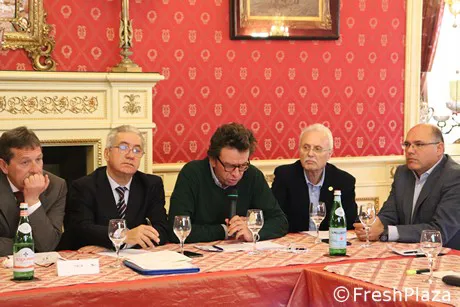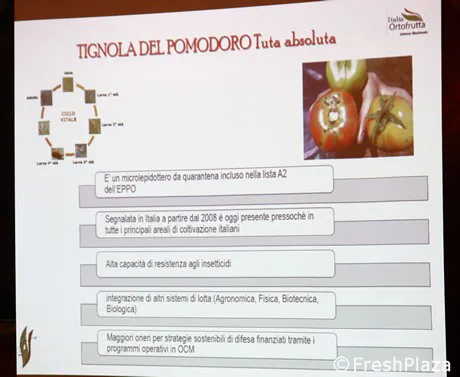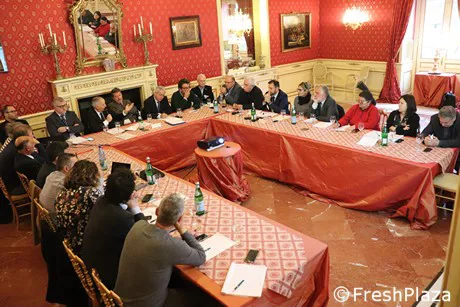New Delhi, Tuta absoluta and ToBRFV - these are the phytosanitary emergencies discussed by the table tomato contact group that met in Ragusa on 4th and 5th April 2019.
Guido Grasso from Confagricoltura briefly illustrated the history of each pathogen and stressed how ToBRFV is easily transmitted via contact but also via seed and how residues remain infected for a long time.
 Left to right: Firrincieli, Cherubini, Grasso, Celestre and Cunsolo
Left to right: Firrincieli, Cherubini, Grasso, Celestre and Cunsolo
"ToBRFV can infect tomato plants that are genetically resistant to the Tomato Mosaic Virus, meaning it is particularly dangerous for tomato crops. Short cycles are recommended to counter the virus more effectively," explained the expert.
Marta Fiordalisi was also present on behalf of Confagricoltura while Gianfranco Cunsolo represented Coldiretti Gianfranco Cunsolo.
The Spanish delegation explained that this virus has not been detected yet in Spain, though Tuta absoluta still persists in Almeria and Murcia, where integrated control techniques are implemented to tackle the problem.

The French delegation reported how the virus does affect a few European countries but not Spain and that, to counter its spreading, treating seeds with chlorine and using the GSPP protocol would be useful.
Salvatore dell'Arte from Alleanza Cooperative Italiane discussed the need to harmonize the use of phytosanitary products in Europe through a specific protocol. "The Euro-Moroccan agreements must be revised with this purpose in mind as well, as some countries employ solutions that are forbidden over here." Elena Albertini and Carmelo Criscione from Alleanza Cooperative Italiane also attended.

Franco Celestre, vice-president Federazione degli Ordini dei dottori Agronomi e Forestali della Sicilia, added that, "in order to limit the spreading of new pathogens within the European territory, it would be useful to implement measures such as using certified propagation material and resistant genotypes, promptly eliminating outbreaks and employ agronomic practices and procedures useful to prevent the spreading of the virus."
"It is important to harmonize the use of pesticides within the EU. We cannot be so limited in Italy, as it leads to an unfair competition when it comes to costs and yields. In addition, it is not possible that Europe easily opens its borders while we can no longer export (to Canada, for example), due to the health restrictions we are imposed," stated Massimo Pavan, head of the Italian delegation.
The Spanish delegation stressed that "the regulations on pesticides are diversified for northern and southern Europe due to obvious climatic reasons. But the inequality between countries is also and mainly due to the many active principles authorized a long time ago and only in some countries. There is a regulation on the reciprocity between countries that could enable the use of pesticides registered abroad, but the bureaucracy and limited timescales frustrate all attempts. A regulation forbidding the entrance to the EU of non-compliance products should enter into force in December 2019."
The French delegation reported an increased awareness of how the country is diminishing the number of active principles. The objective is increasingly that of reaching zero residues. In addition, French growers are obtaining voluntary certifications that reassure consumers as regards the use of pesticides.
Roberto Cherubini reassured those who attended that the contact group that will also involve the Ministries of Agriculture of the three countries involved.
The next meeting will be held in France in 2020.
